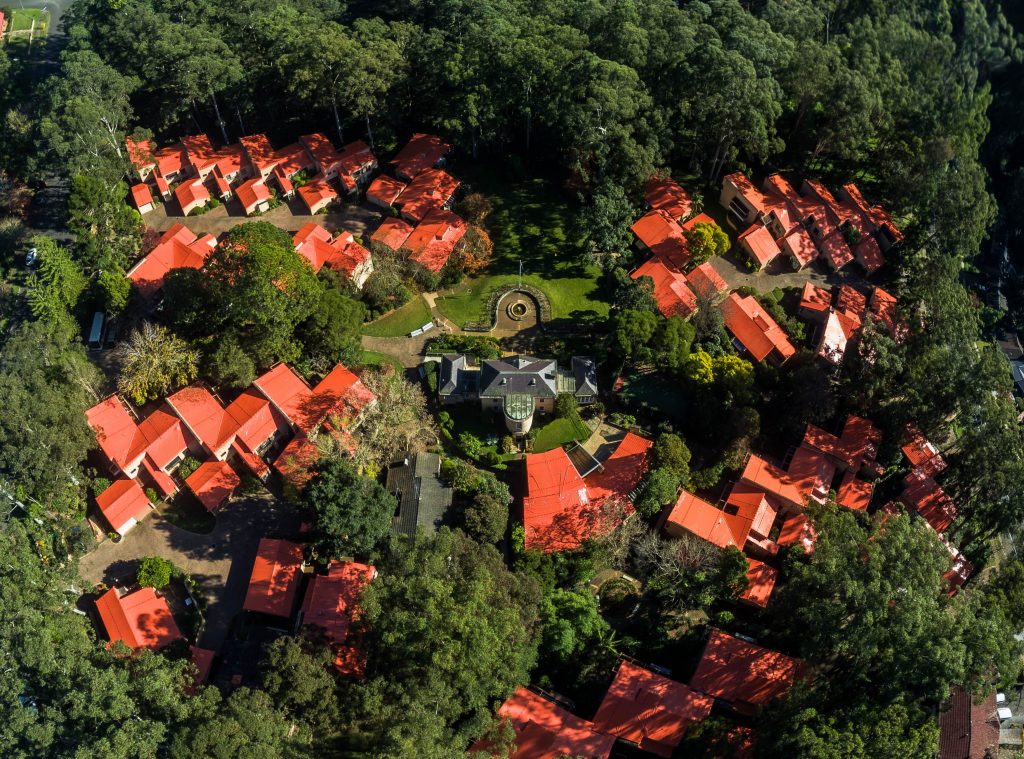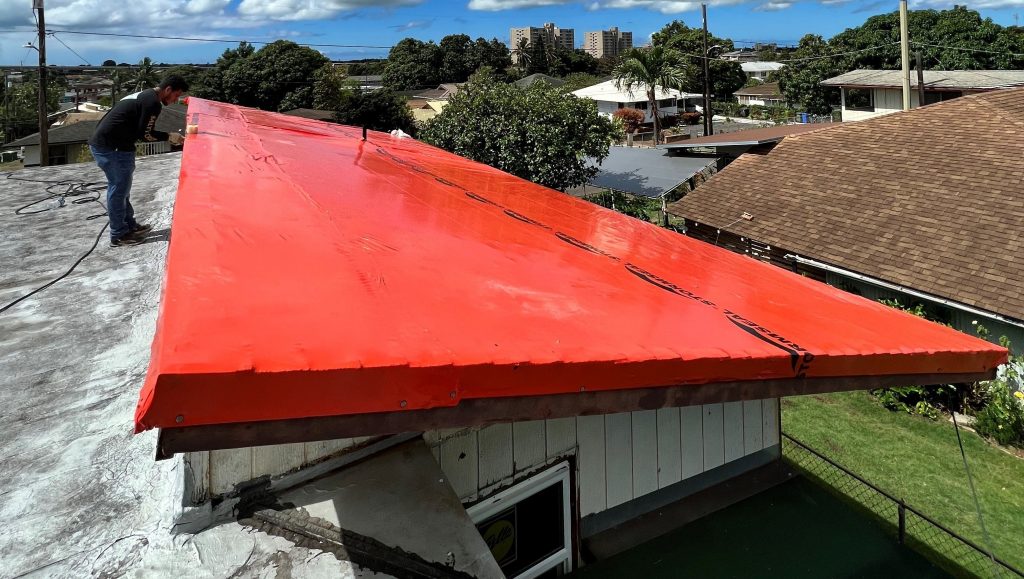Designed for emergency responders, insurance builders and roofers, Stormseal is a polyethylene film that heat-shrinks to securely wrap a damaged roof or structure. Unlike tarpaulins, Stormseal stays put until permanent repairs can be made, resisting wind, rain and hail and preventing further damage.
After one day of training on this award-winning, Australian product, accredited installers gain access to Stormseal film and equipment via online order.
Stormsealed properties worldwide
Including more than 5,000 in Australia. View our Stormseal gallery.
Watertight
Stormseal is also resistant to further storms including heavy hail and winds up to 160km/h.
Months or more of protection
Stormseal can last over a year, giving you peace of mind until final repairs are made. See our extreme test in the Swiss Alps.
Why use Stormseal
You can try your hardest with ropes and sandbags, but as soon as the weather turns wet or windy again, tarps inevitably flap, slip, blow off, leak or collapse under the weight of pooling rainwater. While property owners wait for permanent repairs, tarps fail 5 times on average and up to 13 times over the life of an insurance claim.
This means you get called back repeatedly to reattach tarps – usually in the worst weather, in the middle of the night, and on weekends. The owners also become increasingly distressed and think you’re incompetent (and they aren’t afraid to tell you and everyone else).
With Stormseal, the patented shrinking resins in the film wrap tightly to any roofline or damaged structure, requiring no ropes or sandbags. Heat application increases the strength of the film and creates a snug fit, without damaging any underlying materials.
Stormseal installers:
- do the job right and do it once, with no call-backs
- get pats on the back and grateful smiles from residents, instead of complaints
- grow their businesses – because impressed property owners invite them to quote for the permanent repairs
Use our quick make-safe quiz to determine whether a property needs Stormseal.
What happens during training?
One accredited installer is required in each installation crew. Installer training takes a single day and costs $495, if you hold the prerequisite of Work Safely at Heights attained within the last 3 months, through Pinnacle Safety and Training.
You must have attended Pinnacle Safety and Training’s Working at Height program less than three months prior to your Stormseal course start date. If not, this course is offered at a discounted rate of $149.00pp when booked with a Stormseal course.
Training is conducted by a specialist on a purpose-built roof simulator at locations around Australia. Up to 8 trainees can be accommodated in each course. While there are standard learning outcomes, the training can be customised to suit your work requirements.
The practical, hands-on training includes:
- regulations and legislation
- Stormseal product overview
- Stormseal installation instruction and practice
- risk assessment and hazard elimination
- equipment selection and correct use
- ladder safety training, and
- anchor, fall restraint and arrest systems, focusing on temporary systems on residential roofs.
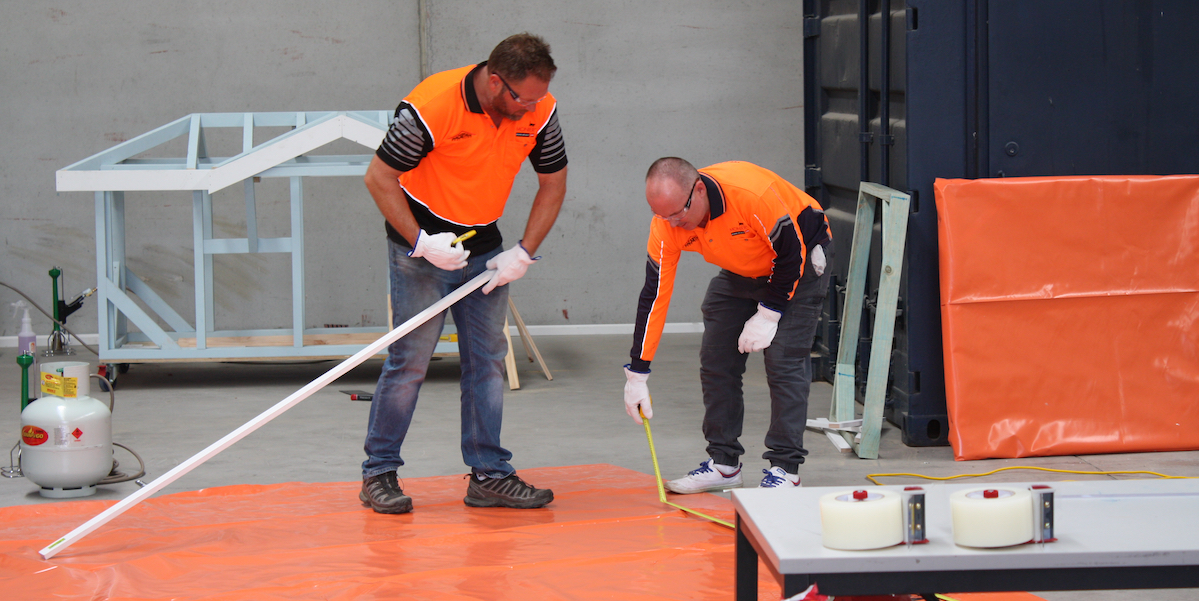

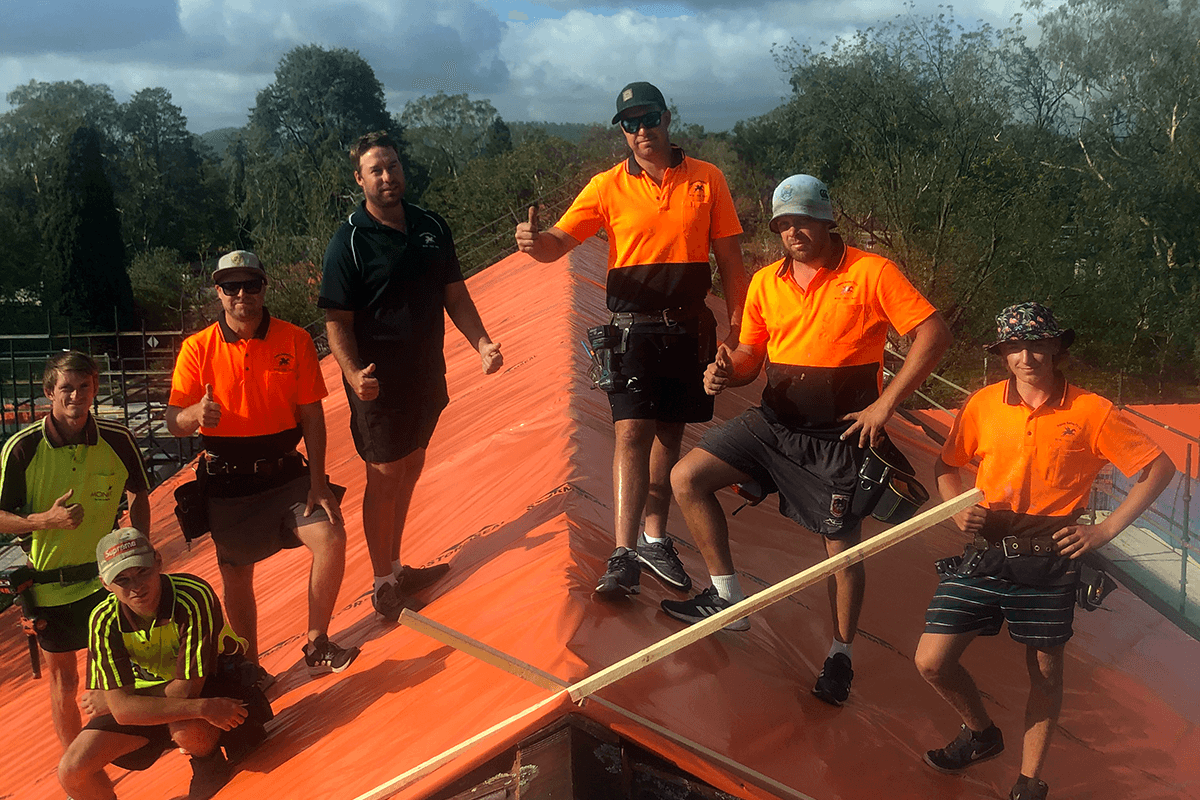
What happens after training?
After successfully completing training, you’ll receive a nationally recognised Statement of Attainment issued by Pinnacle Safety and Training, and a wallet card. You’ll also receive a unique username and password to gain access to Stormseal film and equipment via online order where you can also purchase the Stormseal start-up kit, which has everything you need to start Stormsealing.
The specially designed strongbox holds two rolls of Stormseal and fits on a standard utility vehicle, along with all necessary tools for application.
A roll of Stormseal film is 40m long x 5m wide (200m2) and weighs 37kg. A standard pallet of Stormseal will cover 5000m2. Equivalent tarpaulin weighs almost 4 times as much and requires 8 times as much storage space.
You can also make every roof your own advertising space by putting your logo on the Stormseal film in any colour (conditions apply).
Sign up for training
Stop tarping and start Stormealing today. Choose a training location and date below. If you have questions just give us a call on 02 9599 3335 or email info@stormseal.com. Please book training at least 1 week prior to the start date.
FAQs
We only sell to accredited contractors, pricing is based upon volumes purchased. Please get in touch with us to learn more.
Installers save time by using Stormseal. Tarp installation time includes the time taken to procure supplies of tarpaulin, sandbags and ropes for each job, as contractors generally don’t carry these on their trucks. Frequently, the first tarp purchased is the wrong size, which means a return trip to the hardware store.
Meanwhile, with a roll of film and complete toolbox already on their truck, the Stormseal installer has cut the film on-site to fit the job, and commenced attachment. One roll of Stormseal holds 200m2, or enough film for 10 average make-safe jobs. This equates to about two days’ work without stopping for further supplies.
When repeat visits to replace failed tarps are added to the account, it’s clear that as Stormseal resists all weather and stays put until permanent repairs can be made, it saves contractors vast amounts of time and cuts insurers’ costs dramatically.
We prioritise the safety of workers, residents and properties and discourage practices that increase risks and escalate costs. We’re proud of Stormseal’s excellent reputation and intend to maintain it. To ensure safety and quality, accountability is key. Our solution is a complete system of accredited installer training, specialist equipment, controlled ordering and performance tracking, so our quality assurance processes cover everything from manufacture to installation.
Only accredited installers can order Stormseal film and a toolkit containing everything needed for correct installation. Instead of relying on ropes, sandbags and ‘Hail Mary’s to hold a tarp in place (and when that fails, returning repeatedly to replace the tarp), Stormseal installers do the job once and do it right.
At Stormseal, poor performance means loss of accreditation for the installer. By contrast, in Australia, when a tarpaulin (almost inevitably) performs poorly and requires replacement, the installer is rewarded with an additional make-safe fee from the insurer. Insurers pass these additional costs on to policy holders as higher premiums. Premiums also rise as claims escalate due to additional property damage caused by flapping, leaking tarps.
Storm victims who suffer under tarps and customers hit with higher premiums are likely to seek a better alternative, i.e. an insurer who uses Stormseal to provide a superior customer experience and keep costs down. Our insistence on safety and cost-effective high quality is positively transforming the insurance repairs industry
Our installers mechanically fix all edges of the Stormseal film securely, often to the eaves of the structure. The risk of secondary damage on removal of the film is low, and if it occurs, the cost of replacing fascia boards or some roof tiles is negligible compared to the massive cost of internal damage to properties caused by flapping, leaking, flyaway tarpaulins.
Property damage is also caused by the sandbags and ropes used with tarps. Ropes are often tied to any available attachment point including gutter brackets, down-pipes, gas/water lines and fences. Under the load of wind or pooling rainwater on the tarp, the ropes’ attachment points are frequently damaged. Sandbags break down within six weeks of weather exposure and the sand escapes, filling gutters and valleys to create barriers that force water back into the roof cavity, causing more internal damage.
Stormseal minimises harm. Tarpaulins, ropes and sandbags frequently cause damage claims to multiply manifold. The superior choice is obvious.
No. We hold inventory and dispatch Stormseal film from our stock when an accredited installer places an order online through our customer portal. We have capacity to scale up film production to meet high demand following a severe weather event.
Yes, Stormseal can cover a full roof if damage is total. However, the product is more often used to cover partial roof damage, e.g. tree impact on one side, or fire damage contained to one area.
Yes, Stormseal can be used to cover partial roof damage, e.g. a damaged whirlybird, a section of broken tiles, or over skylights.
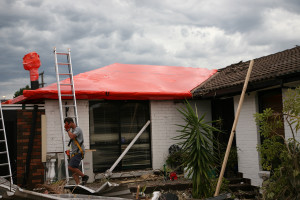
IAG has conducted hail testing on the product, please see the video at: https://youtu.be/rKiFqvavj-Y
Wind tunnel testing has been conducted by CSR and by the HAAG wind tunnel test facility located in Dallas TX. See CSR wind video at: https://youtu.be/0X7w-kF_zXk
Yes, the product can be used for walls, windows, ceilings, garage doors, asbestos removal.
Stormseal film is recyclable; it is not biodegradable. Stormseal film can be repurposed – unlike damaged tarpaulins which generally go to landfill.
Stormseal has two application methods;
Non-intrusive: Stormseal film is fitted to the perimeter of damaged area using external Stormseal brackets, fixed into existing sub-timber like rafters or battens. Typically the roof tile would require replacement.
Intrusive: Stormseal film is attached through roof tiles and or external facia/barge boards at every 1,500mm. In a 10m x 10m area (100m2 or ½ an average house roof) 26 mechanical fixings are required.
Unlike tarps, both Stormseal application methods cause minimal external damage and prevent internal damage by providing lasting, secure weatherproofing.
E.g. Intrusive application of Stormseal might require drilling through roof tiles at 1,500mm centers, with damage costing $14/tile for remove and replace. Considering when a tarp leaks, it can cost $1,500/m2 to restore the water damage inside the home.
Yes, Stormseal film is warranted for one year from the time of purchase. The installation guarantee depends on the individual Accredited Installer’s terms and conditions.
Yes, Stormseal film can be produced in many colours. Branding / logos can be printed on the film –minimum volumes apply.
Yes. An access area can be cut out of the film and then resealed. In every installation there’s a checklist sticker applied to the film. The checklist indicates claim number and installer number so you can track it down.
Yes, we work with several insurance carriers.
Yes. Accredited Stormseal installers are trained to complete a roof report before installing the film. If further assessment is required, contractors often cut inspection panels, in which case an accredited installer must remove and replace the Stormseal film. In every installation there’s a checklist sticker applied to the film. The checklist indicates claim number and installer number Similarly, insurers pay for tarps to be removed for roof inspections and replaced.
Yes, it works on flat roofs for temporary water protection. It’s weldable with a system of joining the film so you can tailor fit it to just about anything.
Use our quick make-safe quiz to determine whether a property needs Stormseal.
#canttarpthat
Show us your great work by tagging your Stormeal installs with #canttarpthat when you upload to Instagram.








